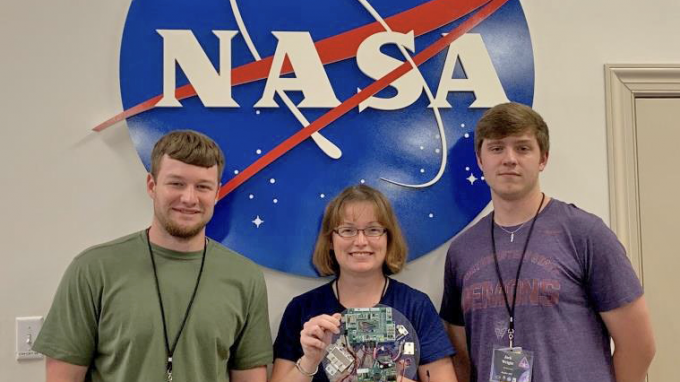LaSPACE grant funded the experience
By: Dr. Anna Dugas
NATCHITOCHES – A student and faculty team from Northwestern State University participated in a research event hosted by NASA earlier this summer at Wallops Flight Facility on the eastern shore of Virginia. Jack Wright of Natchitoches and Holden Rivers of Zwolle, along with Assistant Professor of Physics Anna Dugas, joined 12 other college students and faculty from Louisiana at the RockOn! Workshop where they build and tested a rocked payload that was launched on a sounding rocket. The trip was funded by a grant from the Louisiana Space Grant Consortium (LaSPACE).
“The Terrier-Orion Rocket launched at 5:30 ET June 20. The payload was successfully activated and the team received data,” Dugas said. “There was 35.2 megabytes stored on the microSD card with 478304 lines of data from the accelerometers (3-axis low and medium, 1-axis high), pressure/temperature, humidity, gyroscope and Geiger counter, which yielded from approximately six and a half hours of recording time. The rocket flight length was within 20 minutes, so the data received proved that the G-switch initiated recording and the recording time length was more than sufficient to obtain the time-of-flight measurements. The final battery voltages on the payload were measured both as 8.9 V after initial voltage of 9.7 V, so the payload was designed with a more than sufficient power supply system.”
Rivers, who is majoring in Industrial Engineering Technology, said RockOn! was very organized and participating was a terrific experience that he hopes future NSU students can share.
“There were tons of self-inspections made by workshop workers. This provided clarity when something wasn’t right so it could be fixed without wasting time looking for the problem,” Rivers said. “The attitude of the workshop workers and their leader was very laid back. I believe this offered comfort for what could have been stressful. They did an outstanding job of keeping everyone together and the workshop moving forward.”
Wright, an Electronics Engineering Technology major, said he gained knowledge and information to bring back to the university to apply in the classroom and on future projects.
“The team at RockOn! did an excellent job in helping us have everything well organized and had it down to a fantastic routine,” Wright said. “I hope in the future, NSU can be more involved in participating in similar programs.
Dugas said RockOn! was one of the best professional opportunities she has ever experienced.
“I was amazed at how the workshop’s director Chris Koehler developed such an effective support team, as well as such an effective workshop curriculum and agenda to make sure all attendees at every skill level can learn and build confidence in electronic payload building,” Dugas said. “I was also impressed at the hours the RockOn! Team must have spent after hours fixing the small glitches that came up during the day. For instance, our group had one of the several humidity sensors that had a manufactured problem and the support team replaced our sensor after we left. This workshop was truly fun and educational for my team and I am extremely happy that we got to attend.”
In terms of the payload design, Dugas was impressed by the detailed and highly-visual slides provided on Kindle Fire 7 tables offered to each team member and each PCB board was exceptionally labelled with built-in test ports. She was also impressed that surface mount soldering techniques were included in the training, including the use of reflow iron, and that students came away with respect for people who regularly use surface mount components.
Wright and Rivers also learned how to build effective oscillator and high voltage transformer circuits to operate a Geiger-Muller tube, a hollow cylinder filled with a gas at low pressure used to detect radioactive particles.
“I was also happy that the students now have access to an effective I2C sensors library for the Arduino and they were able to see a complete microSD code on the Arduino IDE, since they struggled with this last spring in one of their courses,” Dugas said.
Outside the workshop, the 15 delegates representing Louisiana and LaSPACE found time for recreation, visiting Tom’s Cove Beach in Chincoteague National Wildlife Refuge and several restaurants on Chincoteague Island.

